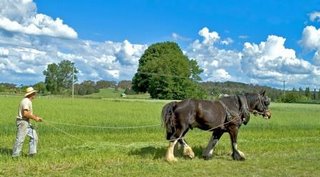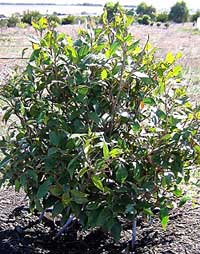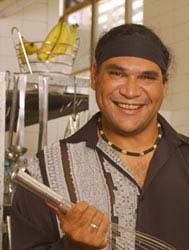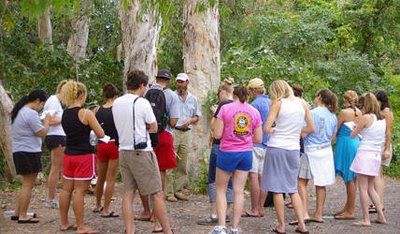
Photo: Gordon Smith, Detail of Orchid Flower. Photo included because I like it!
In my last post, In Search of the Regional Alternative - the case of Katrina and Tom, I reported on an email from Katrina: we are looking for a small town some where who needs the services of a boilermaker who loves a challenge , therein lies the trouble, finding one! "
The first step in the in the search process is to understand your own needs and that of your family. Relocation can be a big step, so you really do need to be clear on your needs before looking seriously at possibilities.
For that reason I emailed Katrina seeking more information. My questions and edited answers follow.
Family Connections
Access to family (parents, grandparents, siblings) can be important, especially for women with children. For that reason I asked "where is your family? Near you? Important to be near them?"
Katrina replied: "The only family we have is my brother and he spends more time overseas than home any way so as long as where ever we go has Internet access then he will be just as close to us as he is now. We do have a very special couple living in Briasbane who are more like family than any one else, but again they are big Internet uses as well and we have discussed this move with them and they think it would be right for us and would give them a place to holiday and an excuse to go! "
Katrina's reply shows that closeness to family is not an issue. However, the reply also draws out that the family are active internet users, so access to the internet is an issue to be considered. Many parts of Regional Australia have equal to if not better internet access than parts of metro Australia, but coverage does vary. So this is an issue that will need to be looked at in considering specific locations.
Children's Needs
No matter how happy parents may be, the move may fail if the needs of children are not taken into account. In this context, Katrina and Tom have four children aged fourteen down to nine weeks.
I therefore emailed Katrina "any special features re education?"
Katrina replied: Education, well my eldest is in grade 8 first year of high school while he isn't brilliant he is holding his own, he travels now to get to a decent school so that will be no big deal for him. The only other concern education wise is my second born who is in grade 6. He has trouble with his reading. He is making progress but slowly, so he would need extra help there. He is on the other hand gifted with maths and the arts. My daughter is well above average so is doing grade 3 and 4 work in her reading yet she is in grade 2 so as long as her teacher is willing to let her move forward at her pace. My youngest obviously has yet to start.
Tom and I love a challenge and our children are not really what you'd call city kids they love to be out doors and don't often play video type games. They email all their friends of course and we all have computers but they still love to run!
We haven't gone into this with our eyes closed we have talked things over with the kids so they are aware of what this would mean, they will miss there friends but will make new ones. They know it and so do I, they are all happy go lucky kids and we would rather they grow up some where where the nastier side of life isn't so in your face all the time, some where that we can feel safe to let them play in their own front yard or to go to the park and know that they will not be harassed or called names for being happy together.
We are a close family as we don't really have any one but each other to rely on so we can be happy any where as long as we have each other and a roof over our heads and plenty to keep dad busy!
Katrina's reply draws out a number of important issues. She and Tom have discussed the move with the kids and have involved them. This is very important since a move away from friends can create real worries in kid's minds.
Education may be an issue in final selection between towns and will need to be investigated. This has to be done on ground. The nature of the support available to the eldest to help with any learning diffculties will be important (country schools can be good in this area because of the personal support that can be provided in a smaller school), as will the capacity of the school to provide accelerated learning opportunities for Katrina and Tom's daughter.
Health services will also need to be investigated on ground. Medical services in a smaller town can be limited, with some services provided in the nearest major regional centre. The critical issue here is not distance but travel time.
Partner Needs
Partner considerations are important in any move because both sides have to be happy.
Katrina's responses focused the needs of Tom and her family, leading me to ask: "What do you want? Do you want to stay at home, to work part time, to work full time? What would you like to do?"
Katrina responded:
What do I want? Well I don't really want to work. I love being a mum and Tom works so I can stay home to raise our kids. Pre children I was working as a seamstress so I love all things making, still do it when I get time, sew that is, I love craft, I quilt, crochet and all things made by hand but my real passion is wood turning I have even sold some on line until getting pregnant and being unable to use the lathe for safety reasons .... I love to read and learn to make new things I am always on the look out for some thing new to try and create.
looking at this, Katrina can be happy pretty much anywhere so long as she and her family have the life style they need.
The life style issue is critical. The life Tom and Katrina want is really no longer obtainable in a metro area. Tom and Katrina need a biggish block with access to a shed and place for the children to play, to dig, to have pets. They need an area in which it is still posssible for the kids to hop on their bikes and vanish without their parents being worried.
In the next post I will discuss how Katrina and Tom might set about finding the job that Tom wants.
 Photo: Gordon Smith, Dorrigo Show. Gordon's caption reads in his usual terse but descriptive style:
Photo: Gordon Smith, Dorrigo Show. Gordon's caption reads in his usual terse but descriptive style:









